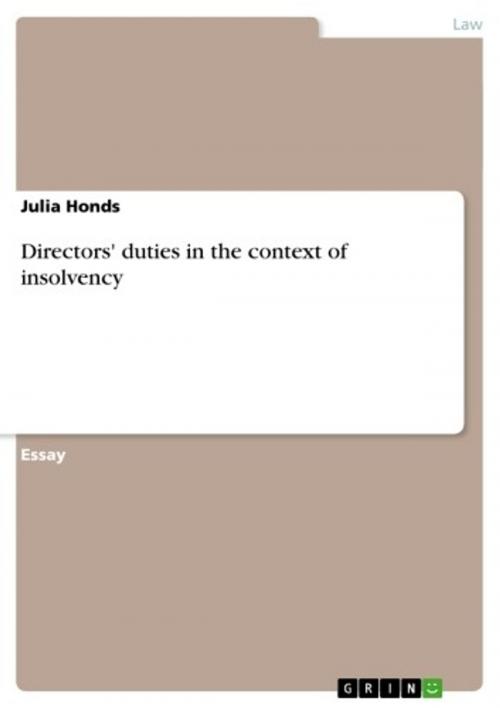| Author: | Julia Honds | ISBN: | 9783638877350 |
| Publisher: | GRIN Publishing | Publication: | December 17, 2007 |
| Imprint: | GRIN Publishing | Language: | English |
| Author: | Julia Honds |
| ISBN: | 9783638877350 |
| Publisher: | GRIN Publishing |
| Publication: | December 17, 2007 |
| Imprint: | GRIN Publishing |
| Language: | English |
Essay from the year 2006 in the subject Law - Comparative Legal Systems, Comparative Law, grade: A, Victoria University of Wellington, course: LLM Research Paper, Master Abschlussarbeit, 59 entries in the bibliography, language: English, abstract: This essay deals with directors' duties, focusing on the duties that specially arise in the context of a company becoming insolvent. The relevant duties are those under sections 131, 135 and 136 of the Companies Act 1993. The drafting of these insolvent trading provisions in New Zealand has been criticised in the legal literature. This research paper considers not only this criticism but also deals with the more general debate about the value of insolvent trading provisions in general. Although the current drafting of the relevant provisions in New Zealand is not without minor flaws, the need for creditor protection requires the maintenance of insolvent trading provisions in general. Besides that, this essay looks at the remedies for breaches of directors' duties. The most important provision in this context is s 301 Companies Act 1993. Pursuant to this provision both the liquidator and individual creditors can enforce directors' civil liability. However, the possibilities of individual creditors to obtain payment directly to themselves are restricted. The final part of this essay considers the question whether a separate duty directly owed to individual creditors should be introduced. Although such a duty seems to have some benefits, it would not be commensurate with leading principles and ideas of Insolvency Law and should therefore not be introduced. It is the concern of this research paper to point out the many issues that arise in context of directors' duties and insolvency law and to show that it is important to strike an appropriate balance between the intended creditor protection and the entrepreneurial freedom of company directors.
Essay from the year 2006 in the subject Law - Comparative Legal Systems, Comparative Law, grade: A, Victoria University of Wellington, course: LLM Research Paper, Master Abschlussarbeit, 59 entries in the bibliography, language: English, abstract: This essay deals with directors' duties, focusing on the duties that specially arise in the context of a company becoming insolvent. The relevant duties are those under sections 131, 135 and 136 of the Companies Act 1993. The drafting of these insolvent trading provisions in New Zealand has been criticised in the legal literature. This research paper considers not only this criticism but also deals with the more general debate about the value of insolvent trading provisions in general. Although the current drafting of the relevant provisions in New Zealand is not without minor flaws, the need for creditor protection requires the maintenance of insolvent trading provisions in general. Besides that, this essay looks at the remedies for breaches of directors' duties. The most important provision in this context is s 301 Companies Act 1993. Pursuant to this provision both the liquidator and individual creditors can enforce directors' civil liability. However, the possibilities of individual creditors to obtain payment directly to themselves are restricted. The final part of this essay considers the question whether a separate duty directly owed to individual creditors should be introduced. Although such a duty seems to have some benefits, it would not be commensurate with leading principles and ideas of Insolvency Law and should therefore not be introduced. It is the concern of this research paper to point out the many issues that arise in context of directors' duties and insolvency law and to show that it is important to strike an appropriate balance between the intended creditor protection and the entrepreneurial freedom of company directors.















